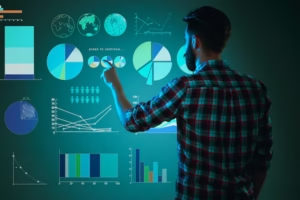Digital Marketing vs Data Science – Which Online Course Should You Pick?
Meta Description
Confused between Digital Marketing and Data Science? Discover a detailed comparison of career scope, salary, skills, and job opportunities in 2025. Learn which online course is the right choice for you.
Introduction
In 2025, two of the most popular online courses students and professionals are considering are Digital Marketing and Data Science. Both fields are booming, both promise high-paying careers, and both are shaping the future of industries worldwide. But the question remains: Digital Marketing vs Data Science – which online course should you pick? Choosing between the two depends on your career goals, skill set, and interest in either technology-driven analytics or creative marketing strategies. This blog will break down the differences, career opportunities, salary scope, skills required, and industry demand for both, so you can make an informed decision.
Understanding Digital Marketing
Digital Marketing refers to the promotion of products, services, or brands using digital platforms such as Google, Facebook, Instagram, YouTube, and websites. With over 6 billion internet users globally, businesses are increasingly focusing on digital channels to reach customers effectively. An online course in digital marketing teaches you SEO, SEM, social media marketing, content creation, Google Ads, and analytics.
A career in digital marketing is well-suited for those who are creative, love communication, and enjoy experimenting with strategies to engage online audiences. From startups to multinational companies, every business today needs digital marketers to stay competitive.
Understanding Data Science
Data Science, on the other hand, is all about analyzing large sets of data to uncover trends, patterns, and insights that help businesses make better decisions. It involves statistical analysis, programming (Python, R, SQL), machine learning, and data visualization tools. Data Science is the backbone of artificial intelligence, automation, and predictive modeling.
An online course in Data Science prepares you for roles like Data Scientist, Data Analyst, Machine Learning Engineer, and Business Intelligence Specialist. If you enjoy working with numbers, solving complex problems, and building AI-powered solutions, this field might be the right choice for you.
Skills Required
Digital Marketing
Digital marketing courses emphasize soft and technical skills such as creativity, communication, content writing, SEO, social media handling, PPC campaigns, and analytics interpretation. A marketing mindset with adaptability to ever-changing trends is essential.
Data Science
Data Science requires strong analytical and technical skills, including programming knowledge (Python, R, SQL), mathematics, statistics, problem-solving, and expertise in machine learning algorithms. It’s more suitable for individuals who are inclined toward logical reasoning and technical development.
Career Opportunities
Digital Marketing Careers
Digital Marketing offers career paths such as SEO Specialist, Social Media Manager, PPC Expert, Email Marketing Specialist, Content Strategist, and Digital Marketing Manager. With e-commerce and online businesses booming, digital marketers are in high demand across industries like retail, education, healthcare, IT, and finance.
Data Science Careers
Data Science professionals can work as Data Scientists, Data Analysts, Machine Learning Engineers, AI Specialists, or Business Intelligence Managers. Since industries rely heavily on data-driven decisions, demand is massive in sectors like finance, healthcare, e-commerce, IT, cybersecurity, and government.
Salary Comparison
Digital Marketing Salary
In India, entry-level digital marketers earn around ₹3–5 LPA, while experienced professionals or managers earn ₹10–25 LPA. Globally, salaries range from \$50,000 to \$120,000 annually depending on skills and region.
Data Science Salary
Data Science is one of the highest-paying careers. In India, beginners earn ₹6–8 LPA, while mid-level professionals earn ₹15–25 LPA. Globally, data scientists earn between \$90,000 and \$150,000 annually, with top professionals crossing \$200,000.
Job Market Demand in 2025
The demand for both digital marketers and data scientists is rising, but for different reasons. Digital Marketing is fueled by the growth of online businesses, influencer culture, and global e-commerce expansion. Data Science, on the other hand, is driven by artificial intelligence, big data, and automation transforming industries.
According to recent reports, by 2025:
- Digital Marketing job roles will grow by over 25% globally.
- Data Science-related roles will see a 35% rise, especially with AI-powered industries.
Online Courses – What You’ll Learn
Online Digital Marketing Courses
These typically include SEO, Social Media Marketing, Google Ads, Email Marketing, Content Strategy, Affiliate Marketing, Analytics, and Brand Building. Platforms like Coursera, Udemy, and University-backed online MBA/PGDM programs offer specialized modules.
Online Data Science Courses
These cover Python, R, SQL, Machine Learning, Big Data, AI, Deep Learning, Data Visualization, and Business Analytics. Institutions like IITs, Harvard, and platforms like Coursera, edX, and Great Learning offer structured online Data Science programs.
Which One is Easier to Learn?
Digital Marketing is comparatively easier to learn for beginners since it doesn’t require advanced technical skills. A student from any background can start and build expertise through practice and creativity. Data Science, however, demands strong mathematical and programming skills, making it more challenging but also more rewarding for those who succeed.
Future Growth and Stability
Digital Marketing will continue to expand as businesses shift online, making it a stable career option. The scope will grow further with AI tools in marketing automation. Data Science will be at the heart of AI, robotics, and automation, making it one of the most futuristic and secure careers. Both offer long-term stability, but Data Science has an edge in terms of future technological advancements.
Which Course Should You Pick?
The decision between Digital Marketing and Data Science depends on your interests:
- Pick Digital Marketing if you love creativity, communication, branding, and engaging with audiences.
- Pick Data Science if you enjoy coding, data analysis, mathematics, and working on AI-driven innovations.
Both fields have excellent opportunities, but the right choice depends on your strengths and career vision.
Conclusion
When it comes to Digital Marketing vs Data Science, there is no single correct answer. Both careers are booming in 2025 and will continue to shape industries. Digital Marketing suits those who are creative and want quick entry into the corporate world, while Data Science is ideal for those who love analytics and long-term research-driven career growth. The key is to choose an online course that aligns with your passion, skills, and career goals.
FAQs
Q1: Which is better in terms of salary – Digital Marketing or Data Science?
Data Science generally offers higher salaries due to its technical nature and demand in AI-driven industries. However, senior-level digital marketers also earn competitive salaries globally.
Q2: Can I switch from Digital Marketing to Data Science later?
Yes, but it will require learning programming, statistics, and machine learning. Many professionals transition after gaining business experience.
Q3: Which online course is easier for beginners?
Digital Marketing is easier for beginners as it requires less technical knowledge. Data Science is more complex but highly rewarding.
Q4: Do both careers have global opportunities?
Yes. Digital Marketing offers remote and freelance opportunities worldwide, while Data Science offers international job placements in top companies.
Q5: Which online course should I choose after graduation?
If you are from a technical or analytical background, Data Science might be a good fit. If you are from arts, commerce, or business backgrounds, Digital Marketing can be a smoother entry point.

















